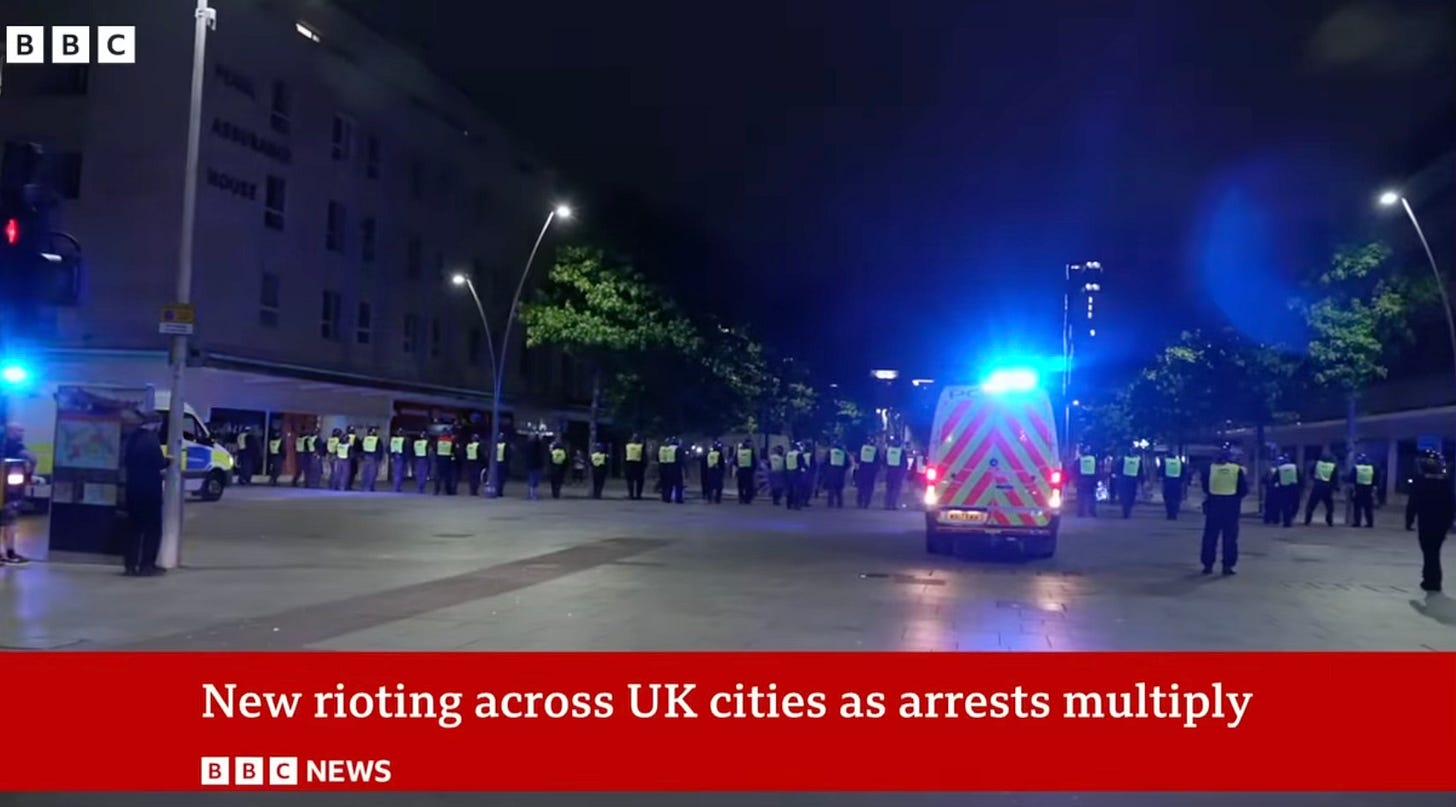The militant far-right is at its weakest, and other thoughts on the riots
Plus, this crusade against 'misinformation' will backfire
I wanted to write down some thoughts on the recent far-right riots across the UK - and the subsequent reaction. But I also didn’t want to write several articles, so these are more like brief notes.
I also didn’t want to repeat what others have said, so hopefully these are original.
The militant far-right is now the weakest it has ever been
I’m old enough to have lived through various iterations of the far-right: the National Front, the BNP, UKIP, and the EDL.
These riots showed;
Movements need institutions to survive and flourish, and the modern far-right does not have one. There was no organised or formalised force behind them, which is why they rose and fell as quickly as they did.
Neither did they have a dominant or uniting ideology: a lot of the participants just wanted to get involved in a riot or have a pop at the police. Many were just non-ideological criminals looking for an opportunity to loot, which is why so many had prior criminal convictions.
“What I want to make really clear is those we’ve arrested aren’t protesters, patriots or decent citizens. They’re thugs and criminals… Around 70 per cent have previous convictions for weapon possession, violence, drugs and other serious offences. Some have football banning orders.”
Polls also showed there was a complete lack of popular support for their demands or tactics.
You might argue that while this is good, they have more support from the mainstream. Even that point isn’t clear-cut.
The BNP got nearly a million votes in the 2009 European elections, and 500,000 votes in the 2010 general election. UKIP was even more popular. There’s always been a strong anti-immigration vote in the UK. While Reform has tapped into that, its leader Nigel Farage was already extremely unpopular and his support has fallen further since.
Besides, the party that popularised “stop the boats” just had its worst electoral defeat in its history.
The radical right is in the same place it has been for the last 20 years, and the militant far-right is reduced to a small rump of louts who got nothing for their riots except jail time. Let’s not fall into the trap of over-stating their power and reach.
This obsession with stamping out “misinformation” will backfire
A lot of people across the liberal-left are united in blaming misinformation for the recent riots, and calling on ways to stamp it out. The former may be true but the latter is a terrible idea.
Firstly, misinformation isn’t just a far-right problem - it affects every issue or campaign on the internet. It’s not just Covid or Russia/Ukraine, misinformation has been rife over the bombardment of Gaza, over events in India, Bangladesh and literally every event or issue you can think of. People of every political persuasion are generally easily tricked into spreading misinformation when it suits their agenda.
Secondly, how do you define or even pinpoint misinformation? Any legal or technological tool would need to overcome these issues and so far no one has. Twitter, pre-Musk, employed an army of people for moderation, and yet still faced constant criticism from all sides. Facebook faced so much criticism for so long that it gave up entirely and now downgrades news and political content on Threads. Who is going to sit there and verify misinformation in real time? And you want to give them the power to censor you without recourse?
If alternatives to X (Bluesky, Threads, Mastodon, Post.news) took off, they would face the same problem: moderation would either become too expensive, or pass on to self-appointed individuals (Reddit, Mastodon).
Lastly, any clampdown on “legal but harmful” content would definitely be misused against minority views or campaigns.
After 9/11, Muslim groups in the UK campaigned for law against religious hatred. It is my understanding the legislation was primarily used against Muslim imams or activists for “hate speech” during the war on terror. They shot their own foot off.
At the time, liberal-minded groups such as Liberty were outspoken against limiting free speech. Annoyingly, they seem to have vanished during the current debate. Any law against “legal but harmful” content is going to come back and bite lefties and liberals when the police or a new government decide to go after someone they don’t like (like climate activists).
We can't treat protesters differently depending on the cause
Literally everyone thinks their cause is noble and justified and should be treated differently to others. That’s not how the law works or should work. Unless everyone is treated equally, trust and order breaks down.
So much as I support the cause of climate activists (and it’s the one closest to my heart) - they should face the law just like far-right protesters.
We can't shut down voices for ‘creating an environment of hate’
People are welcome to condemn the narratives and groups that led to the far-right riots: the racist tabloid newspapers, right-wing populists MPs, the racist "establishment" voices etc.
But no, we shouldn’t shut them down unless they have actually incited violence.
The same debate was raised when the shoe was on the other foot, and Muslims were joining ISIS (and previously al-Qaeda) in worryingly large numbers a decade ago. Should we have locked up every single Muslim group or organisation that contributed to that atmosphere? Many on the right wanted to, but thankfully the law made it difficult for them to do so.
There is a vast difference between political advocacy (even for views you find abhorrent) and violent extremism - and the law should keep making that distinction. It is best for everyone.






